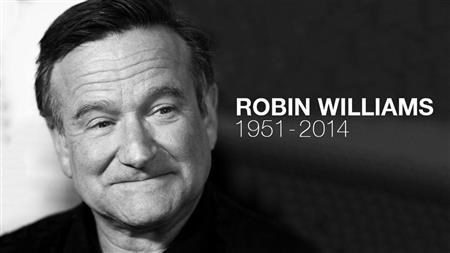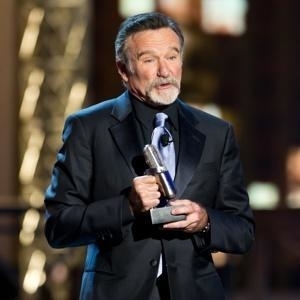 |
| Robin Williams (http://cdn.abclocal.go.com/content/kgo/images/cms/ (ABC 7 News)) |
"[Robin Williams], the stand-up comic and star of 'Mork & Mindy,' 'Good Morning, Vietnam,' 'Good Will Hunting' (for which he won an Oscar) and 'Dead Poets Society,' killed himself on Aug. 11, 2014, in the home he shared with Mrs. Williams in Tiburon, Calif. He was 63" (Carey and Itzkoff). Robin Williams was a great, if troubled man, famous for his comedy and acting. Robin Williams was born, "...on July 21, 1951, in Chicago, to a father who was a Ford Motor Company executive and a mother who was a former model engaged in charity work"("Robin Williams"). Growing up, Williams was often alone because his father was "distant" and his mother was "charming and busy", but also "often absent"("Robin Williams"). Since he was alone so much as a child, Williams developed a passion for comedy to keep himself busy. To be a hero, one must possess bravery, impact the world around them in a positive way, and never back down from anything life throws at them. A courageous person not only doesn't back down from a challenge, but is willing to step out of their comfort zone to do what is best. Even simpler, someone can positively impact the world just by helping out a friend in need. However, the most difficult of the three would be taking life's challenges. Often times, it can seem to someone like the whole world is trying to sabotage them, but to be able to accept that and not be bogged down takes a special kind of person. Robin Williams is a hero because he was courageous, had a positive effect on others, and faced life's challenges head on.
Robin Williams is a hero because of his courage to do what others would not in his acting roles and in life. Many people who have seen the movie "Aladdin" will say that Genie is one of their favorite and one of the most recognizable characters in the movie. In it, Robin Williams had the courage to do what he wanted with the character to make it truly his own. The article "Robin Williams" says, "As Genie, he managed to make the character memorable. Refusing to be confined by his large-chested blue blob of a body, Williams's Genie metamorphosed into a Scotsman, a dog, Arnold Schwarzenegger, Ed Sullivan, Groucho Marx, a waiter, a rabbit, a dinosaur, William F. Buckley Jr., Robert De Niro, a stewardess, a sheep, Pinocchio, Sebastian from The Little Mermaid, Arsenio Hall, Walter Brennan, Ethel Merman, Rodney Dangerfield, Jack Nicholson, and a one-man band" ("Robin Williams"). With his role as Genie, Williams showed that he was not afraid to take the character he was given and go wild. Unlike most actors, he had the courage to stray from the constraints he was given, and the film likely improved the film as a result. On a slightly different note, Robin Williams was also not afraid to take darker, more somber roles in his career. The article, "Far More Than a Funnyman" says, "In the last decade, Williams seemed drawn to even more offbeat and provocative roles. Ironically for a man who could easily make audiences laugh hysterically, his serious, darker roles might have left the most indelible impression of all" (Puig). Williams craved the risk and potential reward that came along with taking risks in his career. Luckily for him, darker and more serious roles, which don't always go over well with the public, tended to work out alright. Robin Williams' courage to take risks in his career on the possibility of it working out is a trait many people wish they had, and is one reason he is admired.
In his life, Robin Williams always strived to make the world around him a better place and keep others from feeling down. A good example of Robin William's desire to make those around him happy is after an accident paralyzed Christopher Reeve. Williams and Reeve had been classmates at Juilliard when they were younger, where they became "lifelong friends" (Young). After Reeve was in an accident that paralyzed him, Robin Williams sought to cheer him up. According to Susan Young's article, "After [Christopher] Reeve was paralyzed in a horseback-riding accident, Williams sought to perk up his friend's spirits by invading his hospital room and pretending he was an insane Russian doctor" (Young). When the people Robin Williams cared about felt melancholy, he tried anything and everything to cheer them up. His persistent desire to do so shows how much he cared for other human beings, and many times put their happiness before his own. Robin Williams also had a desire to improve the lives of people who were less fortunate than him. According to an article from the St. James Encyclopedia of Popular Culture, "Along with friends Billy Crystal and Whoopi Goldberg, he continues to labor diligently for Comic Relief, a charity for the homeless"("Robin Williams"). Since he knew what feeling lost and alone was like, Robin Williams had a desire to contribute to charity, and did it in a creative way. His work along with other comedians with the Comic Relief charity helped and continues to help the homeless. Their work gives people in need the chance to reach success similar to their own. Like many other inspiring people, Robin Williams can be admired for his positive impact on the people and world around him.
 |
| Robin Williams holds a comedy award. (http://nypost.com/2012/05/06/comedy-awards-salutes (FilmMagic)) |
Robin Williams never let the bumps in the road of life stop him from achieving his goals. Throughout his career, mental illnesses plagued him. Despite them, he still managed to achieve success. For example, in an article on him by Susan Young, the author says, "Through all his personal travails, he earned Grammys, Emmys and an Oscar, and became a tremendous box office draw in such films as Mrs. Doubtfire, The Birdcage and Aladdin"(Young). Every day, he had to fight against his greatest enemy; himself. However, as shown by his awards, Robin Williams fought through his problems to achieve success. As previously stated, Robin Williams suffered from depression and other related issues. However, he not only achieved success with them, but achieved some of his success because of them. In the article, "Far more than a funnyman", author Claudia Puig says, "The man dubbed the 'funniest man alive' by Entertainment Weekly in 1997 battled depression and his familiarity with pain and suffering no doubt informed his roles"(Puig). Instead of letting his own issues consume him, Williams was able to use them to his advantage. By using his negative experiences to fuel his roles, he turned them into positives that helped him reach his goals. Robin Williams was able to do what many others fail to do; accept that life's challenges existed and use them to his advantage. To use a widely known phrase, life gave Williams lemons, and he made lemonade.
Since Robert Williams wasn't afraid to break the mold, always tried to help others, and accepted life's challenges, he is a hero. In acting roles and in his comedy, Mr. Williams often went places many others wouldn't. He made jokes on controversial topics that most other comedians would steer clear of and took risky roles that didn't always work out well. The biggest reason for why Robin Williams inspires other people and I is that he always made the people around him feel better. In an article in The New York Times, Williams' widow is quoted saying, "'Whether he was entertaining millions on stage, film or television, our troops on the front lines, or comforting a sick child,' said Ms. Schneider, ''Robin wanted us to laugh and to feel less afraid'" (Cieply). Regardless of the ailments he faced at the time, Mr. Williams felt the need to lift any burdens you had. When he was at his lowest, he was the type of man to still try to make you laugh, because seeing someone else happy made him happy. In addition, he shows that anyone can achieve success, no matter where they start from. Even he started out as a young boy who became interested in comedy because of his, "hours spent in front of the television" ("Robin Williams"). Everybody has to start somewhere, and he proves that this point holds true. Robin Williams was by no means perfect; nobody is, no matter how close they may seem. Everyone has their own 'baggage', so to speak, that they carry around with them throughout their daily lives. For some people it's lack of self esteem and for others it might be mental illness. But this baggage does not and cannot take away from the person you are underneath; the loving parent, the hilarious comedian, or maybe even the hero. Even though Robin Williams carried just as much or maybe even more baggage than any other person, he still has noble, even heroic traits. So in my eyes, and the eyes of many others, he is a hero.
Cieply, Michael. "Robin Williams Is Said to Have Had Parkinson's." Biography in Context [Gale]. New York Times, 14 Aug. 2014. Web. 5 May 2016.
Itzkoff, Dave, and Benedict Carey. "Widow Cites Dementia in Suicide of Williams." Biography in Context [Gale]. New York Times, 4 Nov. 2015. Web. 5 May 2016.
Puig, Claudia. "Far More than a Funnyman." Biography in Context [Gale]. USA Today, 12 Aug. 2014. Web. 5 May 2016.
"Robin Williams." Biography in Context [Gale]. St. James Encyclopedia of Popular Culture, 2013. Web. 2 May 2016.
Young, Susan. "Being Robin Williams: The Wild Man of Comedy Jokes Easily about His Ups and Downs, but He's Not Making Light. It's Just That the Laughs Are More Important Now." Biography in Context [Gale]. Success, Mar. 2014. Web. 5 May 2016.
Page created on 7/2/2016 12:00:00 AM
Last edited 7/2/2016 12:00:00 AM
